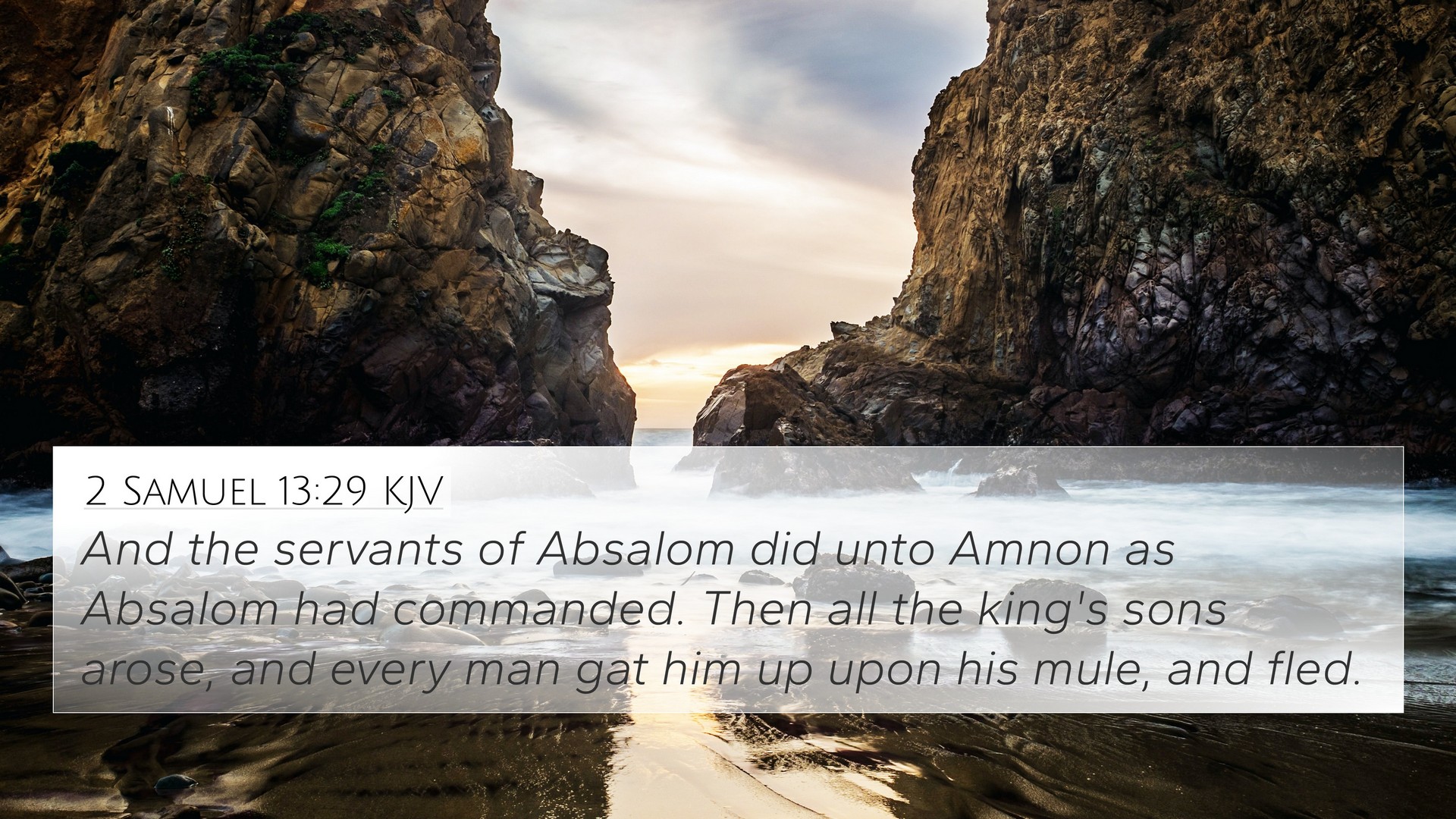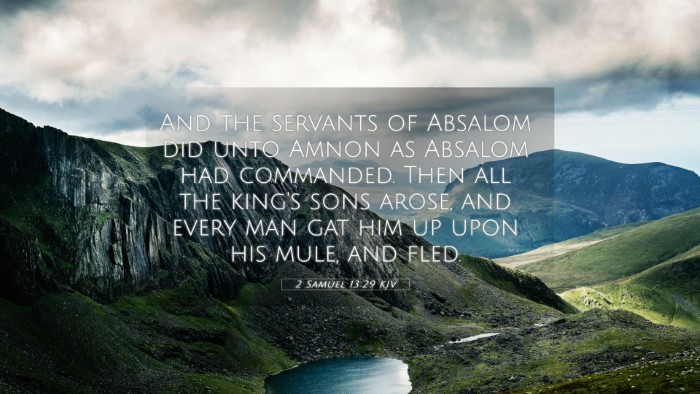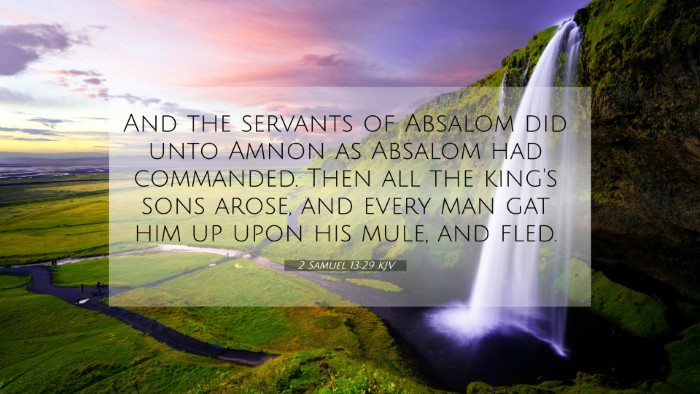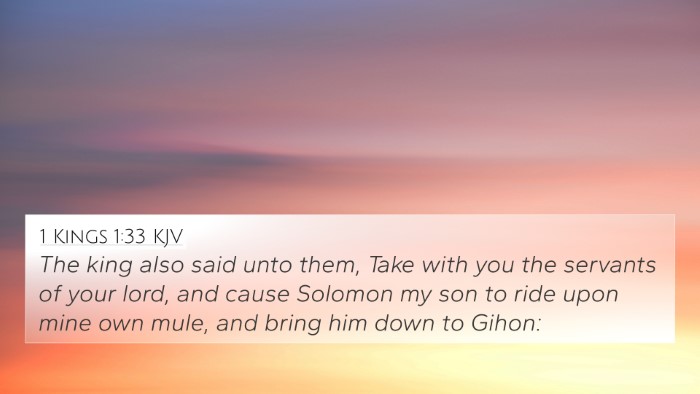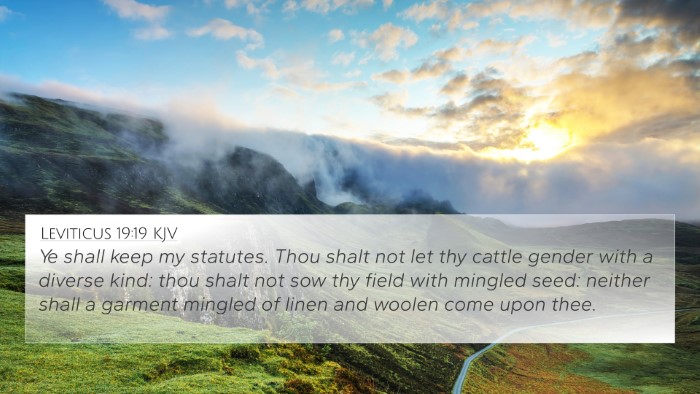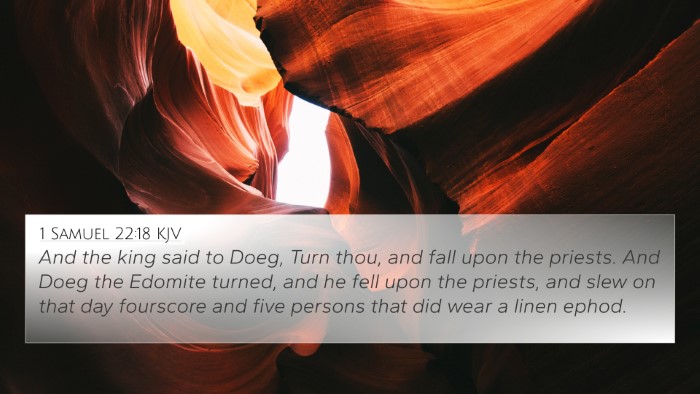Understanding 2 Samuel 13:29
Verse: "And the servants of Absalom did unto Amnon as Absalom had commanded. Then all the king's sons arose, and every man gat him up upon his mule, and fled."
Summary of the Verse
This verse encapsulates a pivotal moment in the narrative surrounding the conflict within King David's family, particularly involving Absalom and Amnon. It depicts the culmination of Absalom's plot to avenge his sister Tamar by orchestrating Amnon's murder during a feast.
Commentary Insights
Matthew Henry's Commentary:
- Henry emphasizes the treachery and emotional turmoil in Absalom's act, noting the complexities of familial relationships in King David's household.
- He highlights the swift execution of Absalom's orders and the immediate reaction of the king's sons, illustrating the fear and chaos following the murder.
Albert Barnes' Notes:
- Barnes discusses the implications of Absalom's actions as deeply rooted in the themes of revenge and justice in the context of David's failure to discipline his children properly.
- He points out how this event foreshadows further divisions and conflicts within David's kingdom, establishing a sense of foreboding.
Adam Clarke's Commentary:
- Clarke reflects on the significance of Amnon's death in relation to the prophetic judgments against David's house, as outlined earlier in the scriptures.
- He also notes the symbolic act of the king's sons fleeing on mules, which can be interpreted as a sign of their innocence being stained by their brother's demise.
Related Bible Cross-References
- Genesis 34:25-31: The story of Dinah and the revenge of her brothers, presenting similar themes of family trauma and violence.
- 2 Samuel 12:10-11: God's judgment on David for his sins, foretelling unrest within his household.
- 1 Kings 2:13-25: The power struggles within David's legacy and its continuation through Solomon's reign.
- 2 Samuel 14:30-31: Absalom's further schemes and the unrest within the kingdom.
- Psalm 55:12-14: A reflection on betrayal, paralleling the inner turmoil found in David’s family.
- Matthew 5:21-22: Jesus's teachings on anger and murder, illustrating the spiritual consequences of familial conflicts.
- Luke 15:11-32: The parable of the prodigal son, revealing themes of forgiveness and familial strife.
Thematic Connections
The themes of revenge and familial discord found in this verse resonate deeply throughout the Bible. The consequences of personal sin and family betrayal are echoed in many narratives, particularly in the books of Samuel and the Psalms. Below are some insights regarding connecting verses:
- The connection between the Old Testament story of Amnon and Tamar and similar accounts of betrayal, such as the story of Joseph and his brothers (Genesis 37:12-36).
- The contrast between divine justice as seen in 2 Samuel 12 and the lawlessness of Absalom's actions.
- A scriptural dialogue on familial roles, responsibilities, and the tragic results of neglecting these can be explored through parallel narratives in the Gospels, like the challenges faced by Jesus in His own family (Mark 3:31-35).
Using Cross-References in Bible Study
By examining cross-references, readers can gain deeper insights into how various scriptures speak to the themes presented in 2 Samuel 13:29. Tools such as Bible concordances, cross-reference guides, and comprehensive Bible reference resources can help facilitate a deeper understanding of scripture connections.
Tips for Effective Cross-Referencing
- Identify Related Themes: Focus on thematic applications of verses across different books of the Bible.
- Compare Contexts: Assess how varying accounts apply the same themes in different scenarios, like revenge, mercy, or justice.
- Utilize Study Bibles: Many study Bibles provide footnotes that offer cross-references which bridge connections between scriptures effectively.
Conclusion
2 Samuel 13:29 serves as an important narrative illustrating the complexities of sin, revenge, and family dynamics within biblical history. Its connections to other scriptures enrich our understanding and reveal the ongoing themes of human struggle and divine justice throughout the Bible.
